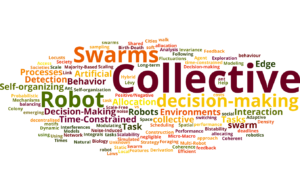My research interests and directions spread over

Computational social science (CSS):
Research here emerges at the intersection of social sciences, and information science. The focus is on understanding, modeling, and simulating complex adaptive systems, for the purpose of (a) behavior prediction, and (b) behavior modulation. Several modeling methodologies are exploited, such as Agent-based modeling, system dynamics, population modeling, and other.
A large body of my studies tackles the design of the individual model and the interaction network between the system units. This, in addition, to develop models for a set of global (macroscopic) properties that emerge at the system level.
- Individual models: I work on the design of individual rules that enable efficient decision-making mechanisms at the individual level. The individual rules capture both the individual perception of the world as well as the feedback received from the individual’s social network.
- Interaction network: I investigate the role of different network models in the context of collective decision-making and research how such well-known models can emerge in a self-organized manner.
Hybrid societies:
These are societies in which artificial agents are integrated into our real world and, more particularly, are dealing with humans. It focuses on designing novel cognitive capacities for artificial agents so that successful interaction with humans becomes feasible. Besides the individual modeling, special attention is paid to social feedback networks that can facilitate the interactions between the two types (agent-human and agent-agent).
Distributed artificial cognition:
The focus is on large-scale distributed systems, in which individuals can interact with each other to exchange any kind of information that helps them to perform beyond their own capacities. This type of system is referred to mostly as a collective system. Collective systems demonstrate complex behaviors that emerge from both (a) the individual simple rules, and (ii) a large number of interactions between the individuals. In my research, I mainly focus on collective decision-making as well as task allocation in collective systems.
- Collective decision-making addresses the problem of achieving a consensus among a large number of individuals that consist of the system on one option (choice). My research deals in general with discrete choice sets.
- Task allocation addresses the problem of splitting a large-scale system and assign individuals to different tasks based on the current demand of the task and its other constraints e.g., its deadline.